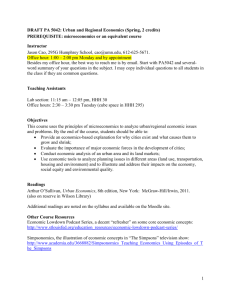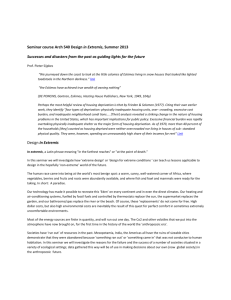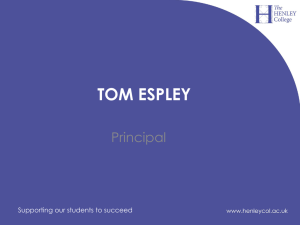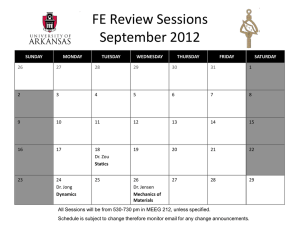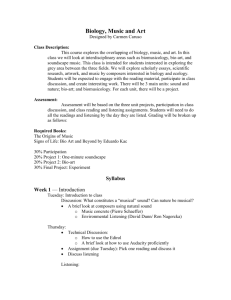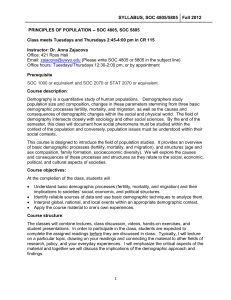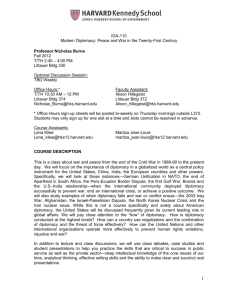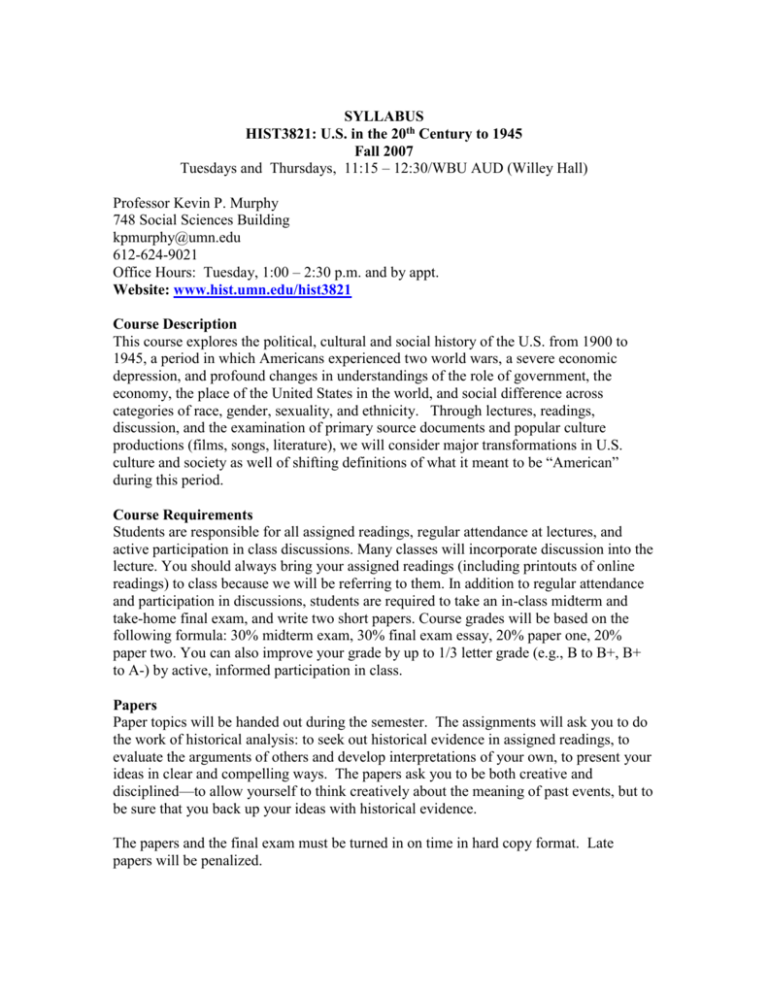
SYLLABUS
HIST3821: U.S. in the 20th Century to 1945
Fall 2007
Tuesdays and Thursdays, 11:15 – 12:30/WBU AUD (Willey Hall)
Professor Kevin P. Murphy
748 Social Sciences Building
kpmurphy@umn.edu
612-624-9021
Office Hours: Tuesday, 1:00 – 2:30 p.m. and by appt.
Website: www.hist.umn.edu/hist3821
Course Description
This course explores the political, cultural and social history of the U.S. from 1900 to
1945, a period in which Americans experienced two world wars, a severe economic
depression, and profound changes in understandings of the role of government, the
economy, the place of the United States in the world, and social difference across
categories of race, gender, sexuality, and ethnicity. Through lectures, readings,
discussion, and the examination of primary source documents and popular culture
productions (films, songs, literature), we will consider major transformations in U.S.
culture and society as well of shifting definitions of what it meant to be “American”
during this period.
Course Requirements
Students are responsible for all assigned readings, regular attendance at lectures, and
active participation in class discussions. Many classes will incorporate discussion into the
lecture. You should always bring your assigned readings (including printouts of online
readings) to class because we will be referring to them. In addition to regular attendance
and participation in discussions, students are required to take an in-class midterm and
take-home final exam, and write two short papers. Course grades will be based on the
following formula: 30% midterm exam, 30% final exam essay, 20% paper one, 20%
paper two. You can also improve your grade by up to 1/3 letter grade (e.g., B to B+, B+
to A-) by active, informed participation in class.
Papers
Paper topics will be handed out during the semester. The assignments will ask you to do
the work of historical analysis: to seek out historical evidence in assigned readings, to
evaluate the arguments of others and develop interpretations of your own, to present your
ideas in clear and compelling ways. The papers ask you to be both creative and
disciplined—to allow yourself to think creatively about the meaning of past events, but to
be sure that you back up your ideas with historical evidence.
The papers and the final exam must be turned in on time in hard copy format. Late
papers will be penalized.
OPTIONAL 1-CREDIT DISCUSSION SECTION
I strongly encourage students to consider enrolling in the optional 1-credit discussion
section.. The section is limited to 25 students. This section will help you to succeed in
the larger course by allowing you to discuss and explore in greater depth the readings,
themes, and issues we encounter. Students in the discussion section may do a few short
additional readings and assignments. Students in the discussion will receive a separate
grade for the discussion.
UNIVERSITY POLICIES
Grades and Grading Policies
University-wide grading standards are as follows:
A - achievement that is outstanding relative to the level necessary to meet course
requirements
B - achievement that is significantly above the level necessary to meet course
requirements
C - achievement that meets the course requirements in every respect
D - achievement that is worthy of credit even though it fails to meet fully the course
requirements
S - achievement that is satisfactory, which is equivalent to a C- or better
F(or N) - Represents failure (or no credit) and signifies that the work was either (1)
completed but at a level of achievement that is not worthy of credit or (2) was not
completed and there was no agreement between the instructor and the student that
the student would be awarded an I (see also I)
I - (Incomplete) Assigned at the discretion of the instructor when, due to extraordinary
circumstances, e.g., hospitalization, a student is prevented from completing the work of
the course on time. Requires a written agreement between instructor and student
Academic dishonesty in any portion of the academic work for a course shall be grounds
for awarding a grade of F or N for the entire course.
Plagiarism:
Use of written material (such as quotations) and/or ideas from the work of other scholars
or writers without acknowledgement constitutes plagiarism. While I reserve the right to
treat cases of unintentional plagiarism, you should be aware that the College of Liberal
Arts recommends a failing grade for any plagiarized assignments. A second offense
would result in a failing course grade. If you are uncertain about the meaning of
plagiarism, please consult me. For more information on academic conduct, contact the
Student Dispute Resolution Center, 107 Eddy Hall (625-5900).
Equal Opportunity:
The University of Minnesota is committed to the policy that all persons shall have equal
access to its programs, facilities, and employment without regard to race, religion, color,
sex, national origin, handicap, age, veteran status, or sexual orientation. For further
information, contact the Office of Equal Opportunity and Affirmative Action in 419
Morrill Hall (624-9547).
Sexual Harrassment:
Sexual harassment means “Unwelcome sexual advances, requests for sexual favors, and
other verbal or physical contact of a sexual nature when (1) submission to such conduct is
made either explicitly or implicitly a term or condition of an individual's employment or
academic advancement in any University activity or program; (2) submission to or
rejection of such conduct by an individual is used as the basis for employment decisions
or academic decisions affecting the individual, or (3) such conduct has the purpose or
effect of unreasonably interfering with an individual's work or academic performance or
creating an intimidating, hostile, or offensive working or academic environment in any
University activity or program.” All faculty, supervisors, and administrators are legally
and ethically obligated to take appropriate action to prevent sexual harassment. For
further information, contact the Office of Equal Opportunity and Affirmative Action in
419 Morrill Hall, 624-9547.
Disabilities:
Any student with a documented disability condition (e.g., physical, learning, psychiatric,
systemic, vision, hearing, etc.) who needs to arrange reasonable accommodations should
contact the instructor and Disability Services at the beginning of the semester. Please
contact me regarding such matters as soon as possible. You can reach Disability Services
at 626-1333 (TTY/voice) or visit their website at http://disserv3.stu.umn.edu.
Required Readings:
Books (available in University Bookstore)
Philip J. Deloria, Indians in Unexpected Places (University of Kansas Press, 2006 paper
ed.)
ISBN 978-0-7006-1459-2
Daniel Hurewitz, Bohemian Los Angeles and the Making of Modern Politics (University
of California Press, 2007). ISBN: 978-0-520-24925-7.
Nella Larsen, Quicksand (with an introduction by Thaddeus M. Davis) Penguin
Twentieth Century Classics Edition, paperback, 2002.
ISBN: 0141181273
Emily S. Rosenberg, Financial Missionaries to the World: The Politics and Culture of
Dollar Diplomacy, 1900-1930 (Duke University Press, 2002). ISBN: 0822332191.
Online Readings:
Readings are hyperlinked in this syllabus, which will be posted on the course website
(www.hist.umn.edu/hist3821). The syllabus will also be emailed to all enrolled students.
Please make copies of these readings and bring with you to class.
Schedule:
WEEK 1: INTRODUCTION
Tuesday, September 4
Introduction to Course
Thursday, September 6
What is History and Who Owns It?
View (in class): “Lisa the Iconoclast”
Read (online):
Transcript of “Who Owns History?” Think Tank with Ben Wattenberg, Public
Broadcasting Service, 1994.
WEEK 2: SETTING THE STAGE
Tuesday, September 11
Reconstructing Race in the Late 19th Century
Read (online):
Booker T. Washington, “Speech Before the Atlanta Cotton States and International
Exposition,” October 18, 1895, Atlanta, GA; and Du Bois, The Souls of Black Folk,
1903, Ch. 3: “Of Mr. Booker T. Washington and Others”
Thursday, September 13
Immigration, Industrialization, and Urbanization
Read (online):
Jacob Riis, How the Other Half Lives: Studies Among the Tenements of New York (New
York: Charles Scribner’s Sons, 1890), Ch. 6, “The Bend” and Ch. 9, “Chinatown”;
Political Cartoons re Chinese Exclusion: "Every Dog (No Distinction of Color) Has His
Day," Harper's Weekly, February 8, 1879; and “Melican Leportee Man Want Gabbee…”
Haprers Weekly, June 14, 1879.
WEEK 3: AMERICAN EMPIRE?
Tuesday, September 18
Spanish-American War, 1898
Read: Rosenberg, 1 -30
Thursday, September 20
Dollar Diplomacy
Read: Rosenberg, 31 - 60
Paper #1 assigned
WEEK 4: RACE, GENDER, AND NATION
Tuesday, September 25
Theodore Roosevelt and “The Strenuous Life”
Read (online):
Theodore Roosevelt, The Strenuous Life: Addresses and Essays (The Century Co., 1900),
Chapters I, II, III, IV, X, and XI.
Thursday, September 27
Ida B. Wells’ and Anti-Lynching
Read(online):
Ida B. Wells Barnett, “Lynching and the Excuse for it,” Independent, May 16, 1901.
Paper #1 Due
WEEK 5: CONSUMING THE MODERN
Tuesday, October 2
Class, Race and Popular Culture
Read:
Deloria, pp. 1 - 108
Thursday, October 4
“Playing Indian” in Hollywood
View (in class): The Mollycoddle, 1920 (selected scenes)
Read:
Deloria, pp. 109 – 240.
WEEK 6: PROGRESSIVE-ERA POLITICS, I.
Tuesday, October 9
Youth, Sex, and the City
Read (online):
Jane Addams, Chapter 1, “City Youth” in The Spirit of Youth and the City Streets
(MacMillan Company, 1909) and Margaret Sanger, “Comstockery in America,” (1915).
Thursday, October 11
Labor and Protest
Read: documents on course website
WEEK 7: PROGRESSIVE-ERA POLITICS, II.
Tuesday, October 16
Citizens and Voters
Read (online): documents on course website
Thursday, October 18
MIDTERM EXAM
WEEK 8: WORLD WAR I
Tuesday, October 23
Read: Rosenberg, 61-96
Thursday, October 25
Read: Rosenberg, 97 -218
WEEK 9:
Tuesday, October 30
Read:
Online: Cartoons from Kirkland H. Day, Camion Cartoons (Boston: Marshall Jones Co.
1919): Deserting, Going Home, Envy of Senegalese Caps
Larsen, Quicksand, Introduction.
Thursday, November 1
Read: Larsen, Quicksand, All.
WEEK 10: GREAT DEPRESSION
Tuesday, November 6
Culture and Economy in the 1920s
Read: Hurewitz, 1 - 76
Thursday, November 8
Great Depression in International Perspective
View (in class): Breadlines
WEEK 11: NEW DEALS
Tuesday, November 13
Labor and Leftist Politics
Read: Hurewitz, 77 - 114
Thursday, November 15
The “New Deal” State
Read: Hurewitz, 115 - 188
WEEK 12: NEW DEAL LEGACIES
Tuesday November 20
Making Sense of the New Deal
Read: Hurewitz, 189 - 282
Thursday, November 22
NO CLASS – THANKSGIVING!
WEEK 13: WORLD WAR II
Tuesday, November 27
U.S. Enters WWII
Read (online):
“About This Site”, The Hawaii Nisei Story: Americans of Japanese Ancestry During
WWII, University of Hawaii.
Paper #2 Assigned (discussion of assignment in class)
Thursday, November 29
Experiencing World War
Read (online): Documents on course website
WEEK 14
Tuesday, December 4
Greatest Generation?
View (in class):
Zoot Suit Riots (PBS)
Paper #2 Due
Thursday, December 6
From Dresden to Hiroshima
Read (online):
US News interview with Leo Szilard, 1960.
A Petition to the President of the United States, 1960.
President Harry Truman, Diary, July 25, 1945.
Harry Truman, Speech, August 9, 1945.
WEEK 15: BEGINNINGS OF THE COLD WAR
Tuesday, December 11
LAST SCHEDULED CLASS
Final exam assigned.
FINAL EXAMINATIONS DUE:
THURSDAY, DECEMBER 20, 3:00 P.M.
DELIVER TO:
748 SOCIAL SCIENCE BUILDING
*E-mailed exams will not be accepted
*Late exams will not be accepted

